A stage manager is the backbone of any theatre or live production — the one who ensures that every cue, prop, actor, and technician is exactly where they need to be when the curtain rises. From rehearsals to opening night, stage managers handle scheduling, communication, and backstage coordination — making sure that creativity meets discipline.
In theatre hiring, your resume matters as much as your reputation. Directors and producers look for professionals who can keep a show running seamlessly, manage chaos with calm, and communicate across departments. A strong resume doesn’t just list productions — it shows consistency, leadership, and technical understanding.
This guide helps you build that kind of resume: clear, credible, and production-ready.
Here’s what you’ll find in this article:
- Real stage management resume examples for every level — from Assistant to Production Stage Manager
- Key skills, certifications, and theatre-specific keywords recruiters look for
- Formatting and layout tips to keep your resume professional and easy to scan
- FAQs and cover letter examples tailored to stage and production professionals
Whether you manage live theatre, touring shows, or studio productions, this guide will help you turn your backstage experience into a resume that commands respect.
Stage Manager Resume Template
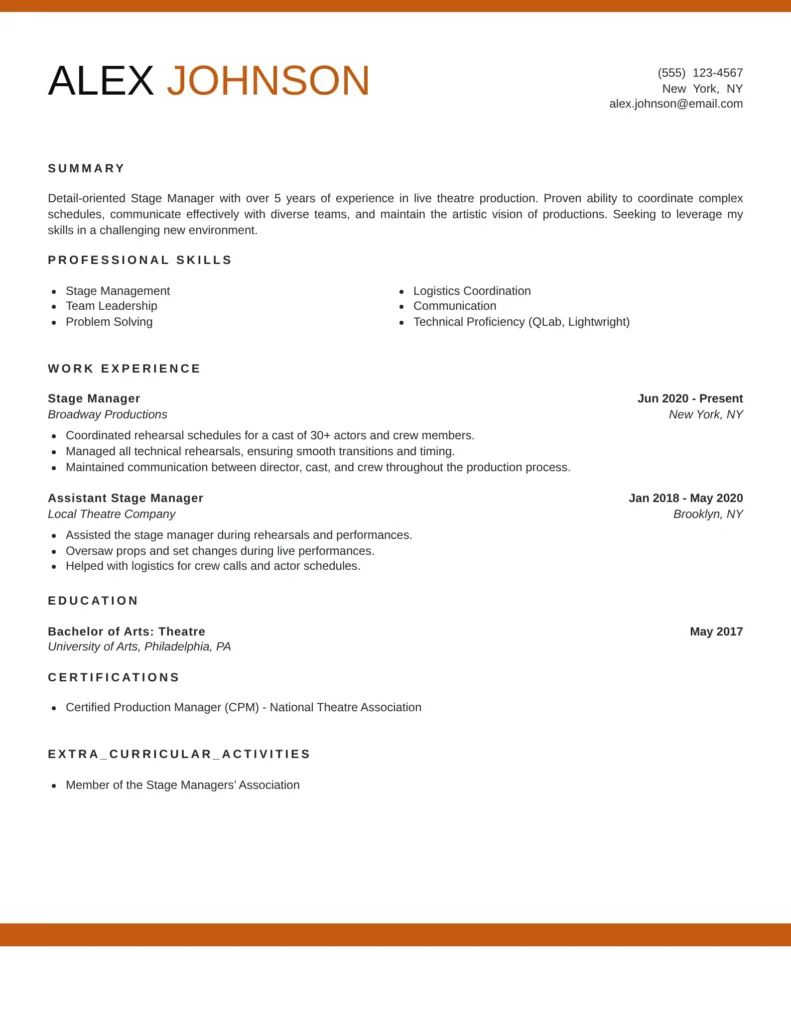
Why This Resume Is Good:
- Strong professional summary: It immediately establishes credibility with “5+ years of experience,” key strengths, and a clear goal — perfect for quick recruiter scanning.
- Focused skill section: Lists core stage management competencies (logistics, leadership, QLab) that directly align with theatre production roles.
- Experience shows progression: Demonstrates career growth from Assistant to Stage Manager with measurable scope (30+ cast and crew, technical rehearsals).
- Clean, theatre-specific layout: The minimalist design and structured formatting make it easy to read while maintaining a professional creative-industry tone.
Assistant Stage Manager Resume Template
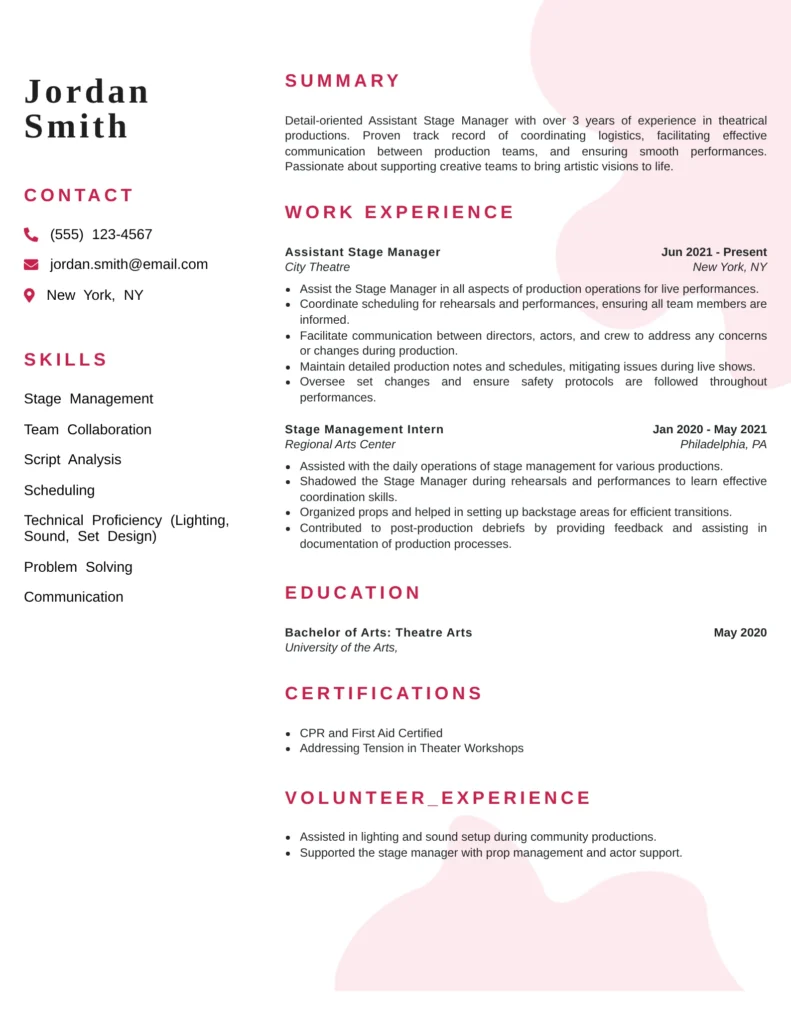
Why This Resume Is Good:
- Clear role focus: Tailored for an Assistant Stage Manager, highlighting coordination, scheduling, and communication—core job functions.
- Strong experience progression: Shows natural growth from intern to assistant, demonstrating hands-on learning and professional development.
- Balanced skills and certifications: Combines technical proficiency (lighting, sound, set design) with soft skills and safety certifications.
- Visually engaging design: Clean layout with color accents and section spacing enhances readability while maintaining a creative yet professional tone.
Production Stage Manager Resume Template
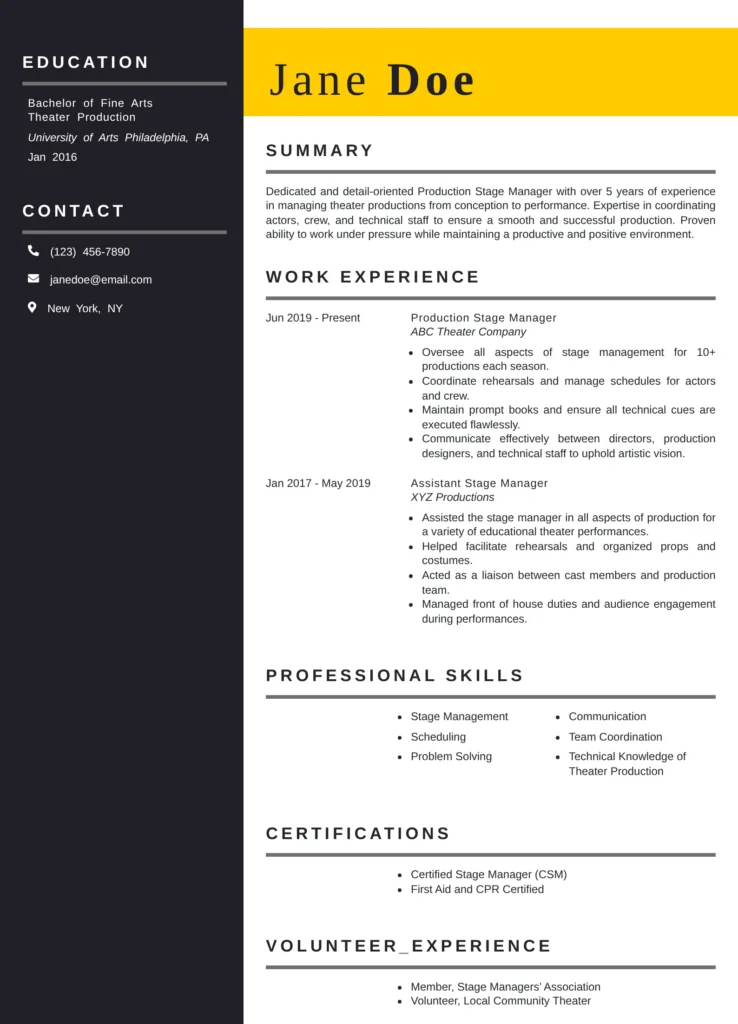
Why This Resume Is Good:
- Professional and high-impact design: The dark sidebar and yellow header create a striking yet polished theatre-industry aesthetic.
- Clear leadership narrative: Shows progression from Assistant to Production Stage Manager with quantifiable scope (10+ productions per season).
- Well-balanced sections: Includes education, certifications, and volunteer experience — enhancing credibility and well-roundedness.
- Strong technical and communication focus: Highlights key production management strengths like cue execution, coordination, and prompt book handling.
Theatre Director Resume Template
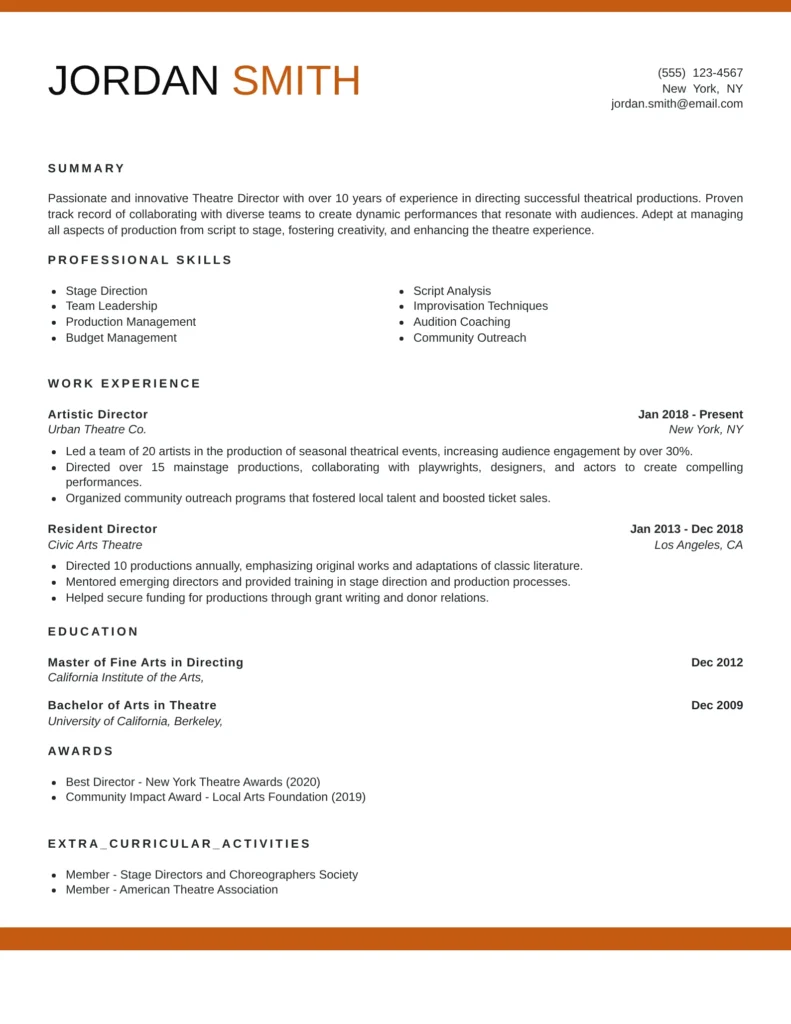
Why This Resume Is Good:
- Strong leadership narrative: Highlights over 10 years of directing experience with measurable impact—like 30% audience growth and 15+ productions.
- Comprehensive skill set: Balances creative (script analysis, improvisation) and managerial (budgeting, production management) skills.
- Awards and affiliations: Adds authority and recognition, reinforcing credibility within the theatre community.
- Elegant layout: Clean, executive-style format with clear hierarchy makes it both visually appealing and easy to scan.
Theatre Producer Resume Template
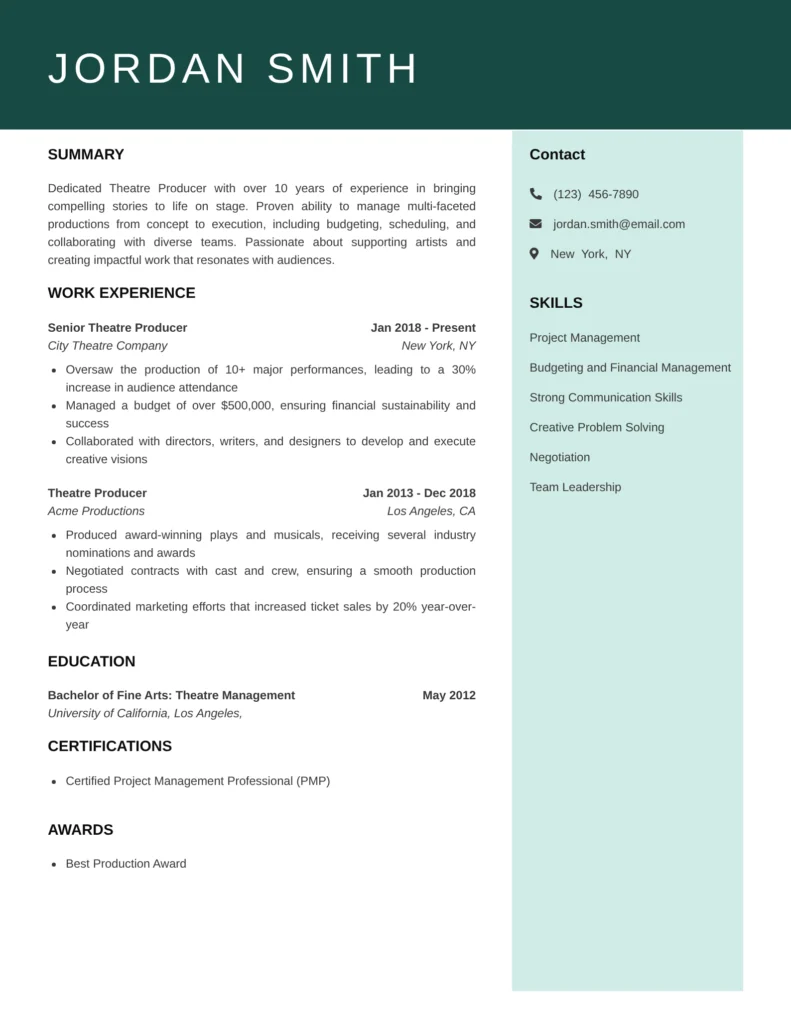
Why This Resume Is Good:
- Executive tone and structure: The summary immediately establishes authority and aligns with leadership roles in theatre production.
- Quantifiable achievements: Mentions budget size ($500,000) and measurable results (30% attendance boost, 20% ticket sales growth).
- Strategic skill selection: Focuses on project management, negotiation, and budgeting—key competencies for a producer.
- Polished dual-column layout: Clean, modern design separates contact/skills for easy scanning while maintaining a professional visual balance.
Resume Format & Template Selection
For stage managers, the resume isn’t just a formality — it’s your production log in one page. It should show organization, attention to detail, and the ability to handle complex logistics. The best format for this profession is the reverse chronological resume, which highlights your most recent productions, venues, and collaborations first. This helps hiring directors quickly see your experience level and the scale of shows you’ve managed.
When choosing a template, think of it the same way you think about a cue sheet — clarity over creativity. Directors and producers scan dozens of resumes; they need to find your roles, productions, and skills instantly.
What works best for stage managers:
- Reverse chronological layout — starts with your latest theatre or production work.
- Simple, single-column design — avoids clutter and prints cleanly for casting folders.
- Sections for “Productions Managed” or “Selected Credits” — these matter more than generic job titles.
- Room for certifications and union memberships (AEA, USITT, etc.) — credibility cues.
MyResumeStar’s templates fit this structure perfectly — modern, editable, and ATS-friendly, yet flexible enough to add creative touches like production credits, references, or rehearsal logs.
If you’re ready to start with a layout that looks like it belongs in a director’s binder, explore:
Once your format is set, the next step is filling it with the right foundation — your Education Section.
Stage Manager Resume Example | Text Sample
Olivia Bennett
New York, NY • olivia.bennett@email.com • (212) 776-4421
Summary
Experienced Stage Manager with 7+ years managing rehearsals, cue calling, and backstage coordination for Broadway and regional productions. Known for keeping live shows seamless and on schedule through calm leadership, technical precision, and clear communication between cast and crew.
Skills
- Cue calling & show sequencing
- Rehearsal scheduling & production notes
- Crew coordination & backstage management
- QLab, StageWrite & Propared proficiency
- OSHA & Equity compliance
- Lighting, props & set transitions
Work Experience
Stage Manager | Lincoln Center Theatre, NY
Apr 2021 – Present
- Managed cue sequences and technical rehearsals for “The Crucible” and “Othello.”
- Coordinated daily cast calls, reports, and performance notes across departments.
- Ensured show safety and timing accuracy, reducing on-stage technical errors by 25%.
Assistant Stage Manager | Hudson Repertory Company, NY
Jan 2017 – Mar 2021
- Oversaw prop placement, scene changes, and communication between lighting and costume crews.
- Supported the head stage manager in show reports and cue adjustments for 60+ performances.
Education
Bachelor of Fine Arts in Theatre Production
New York University, Tisch School of the Arts — 2016
Certifications
- OSHA 30-Hour General Industry Safety
- First Aid & CPR Certified
Why This Resume Is Good:
- Highlights real theatre terminology (cue calling, scene transitions, rehearsal reports).
- Balanced mix of technical and leadership skills.
- Experience written with quantifiable results (e.g., “reduced technical errors by 25%”).
- Layout mirrors professional theatre documentation — clear, precise, and role-driven.
Assistant Stage Manager Resume Example | Text Sample
Daniel Ruiz
Chicago, IL • daniel.ruiz@email.com • (773) 221-0087
Summary
Dedicated Assistant Stage Manager with 5+ years supporting live productions and rehearsals across regional theatres. Skilled in prop management, communication between departments, and backstage coordination. Recognized for maintaining smooth transitions, disciplined organization, and reliability during technical weeks.
Skills
- Prop setup & tracking
- Rehearsal coordination & call sheets
- Cue following & stage transitions
- Team communication & task delegation
- Lighting & costume quick-change assistance
- Production documentation & show reports
Work Experience
Assistant Stage Manager | Goodman Theatre, Chicago, IL
Jun 2020 – Present
- Prepared daily rehearsal notes and coordinated communication between directors and tech crew.
- Managed backstage setup and transitions for The Crucible and Cabaret.
- Ensured all cue sheets, props, and costume changes were executed on time for 40+ shows.
Stage Crew Coordinator | Chicago Performing Arts Center, IL
May 2017 – May 2020
- Oversaw backstage crew and volunteers during community theatre runs.
- Assisted with sound checks, scene transitions, and post-show resets.
- Trained new interns on prop handling and backstage etiquette.
Education
Bachelor of Arts in Performing Arts Management
DePaul University, Chicago, IL — 2016
Certifications
- CPR and First Aid Certified
- Stage Management Workshop — USITT (2019)
Why This Resume Is Good:
- Focuses on supportive and coordination-based roles, ideal for assistant level.
- Uses real production actions (cue following, call sheets, prop tracking).
- Highlights reliability and multitasking — crucial assistant traits.
- Keeps tone humble yet professional, matching backstage hierarchy.
Production Stage Manager Resume Example | Text Sample
Melissa Grant
Los Angeles, CA • melissa.grant@email.com • (310) 555-9087
Summary
Seasoned Production Stage Manager with 10+ years overseeing multi-department coordination, scheduling, and touring logistics for large-scale theatrical productions. Skilled in managing complex workflows across lighting, sound, and set design teams while ensuring technical precision and performer safety during live runs.
Skills
- Multi-department production coordination
- Tour management & scheduling
- Budget and resource allocation
- Technical rehearsals & cue calling
- Team supervision & leadership
- Safety compliance & performance reporting
Work Experience
Production Stage Manager | Center Theatre Group, Los Angeles, CA
Mar 2018 – Present
- Led full production management for Les Misérables and Phantom of the Opera tours.
- Oversaw 50+ cast and crew members, coordinating between design, lighting, and sound departments.
- Reduced rehearsal-to-performance setup time by 20% through improved crew scheduling.
- Implemented digital cue tracking system using Propared for all touring shows.
Stage Manager | Geffen Playhouse, Los Angeles, CA
Jan 2013 – Feb 2018
- Managed rehearsal notes, stage plots, and on-site safety protocols for 100+ performances.
- Collaborated with directors and designers to ensure seamless scene transitions.
- Supervised backstage coordination during extended runs and technical previews.
Education
Bachelor of Fine Arts in Theatre Production
University of Southern California — 2012
Certifications
- Event Safety Alliance (ESA) Certified
- QLab Advanced Training (2021)
Why This Resume Is Good:
- Targets senior-level stage management roles with clear leadership focus.
- Quantifies scale and results (e.g., 50+ cast and crew, reduced setup time by 20%).
- Emphasizes cross-department coordination — key to production-level management.
- Uses concise, authoritative tone fitting for high-responsibility positions.
Theatre Director Resume Example | Text Sample
Jonathan Ellis
Brooklyn, NY • jonathan.ellis@email.com • (646) 900-2255
Summary
Creative and results-driven Theatre Director with 12+ years of experience directing stage productions across Broadway, regional, and community theatres. Skilled in storytelling, casting, and stage composition. Recognized for blending artistic vision with strong leadership and production management to deliver emotionally engaging performances.
Skills
- Direction & artistic vision
- Script analysis & stage blocking
- Casting & actor development
- Rehearsal planning & coordination
- Team leadership & creative collaboration
- Budgeting & production scheduling
Work Experience
Theatre Director | Manhattan Repertory Theatre, NY
Mar 2016 – Present
- Directed 15+ full-length productions, including A Streetcar Named Desire and The Cherry Orchard.
- Managed creative teams of designers, choreographers, and actors for each project.
- Achieved a 98% on-time opening record with strong rehearsal discipline and team coordination.
- Developed a mentorship program for assistant directors and interns.
Associate Director | Lincoln Center Theatre, NY
Jan 2011 – Feb 2016
- Assisted in production of King Lear and The Tempest, coordinating between artistic and technical teams.
- Worked directly with playwrights and producers to align scripts with creative intent.
- Oversaw stage rehearsals, blocking, and actor feedback sessions.
Education
Master of Fine Arts (MFA) in Directing
Yale School of Drama — 2010
Certifications
- Directors Guild of America (DGA) Member
- USITT Advanced Theatre Directing Program
Why This Resume Is Good:
- Showcases artistic and leadership balance, not just creativity.
- Uses production-specific metrics (number of shows, opening record).
- Highlights mentorship and collaboration, key director qualities.
- Tone feels authoritative yet artistic — ideal for both creative and managerial review.
Theatre Producer Resume Example | Text Sample
Samantha Howard
Los Angeles, CA • samantha.howard@email.com • (213) 447-9078
Summary
Strategic Theatre Producer with 10+ years of experience financing, managing, and promoting stage productions across regional and touring circuits. Proven record of overseeing budgets, negotiating contracts, and coordinating creative teams from concept to curtain call. Adept at balancing artistry with business insight to deliver successful, high-quality performances on time and within budget.
Skills
- Production budgeting & financial management
- Contract negotiation & vendor coordination
- Talent acquisition & union compliance
- Marketing strategy & sponsorship outreach
- Scheduling & production logistics
- Leadership & interdepartmental coordination
Work Experience
Lead Producer | West Coast Theatre Collective, Los Angeles, CA
Feb 2018 – Present
- Produced 20+ full-length stage productions and 5 regional tours, including Into the Woods and Wicked Revival.
- Managed budgets exceeding $1.5M annually, maintaining profitability without artistic compromise.
- Built partnerships with sponsors and investors, increasing funding by 40%.
- Streamlined production timelines, reducing rehearsal-to-opening cycles by two weeks.
Associate Producer | Pasadena Playhouse, CA
May 2013 – Jan 2018
- Oversaw scheduling, vendor contracts, and crew payroll for multiple concurrent shows.
- Collaborated with directors and marketing teams to ensure cohesive storytelling and promotion.
- Assisted in post-production evaluations and annual theatre grant proposals.
Education
Bachelor of Fine Arts in Theatre Management
University of California, Los Angeles (UCLA) — 2012
Certifications
- Event Management Professional Certificate – The Theatre Producers Guild
- CPR and OSHA Safety Certified
Why This Resume Is Good:
- Balances creative oversight with strong business acumen.
- Uses quantifiable impact metrics (budgets, tours, funding growth).
- Shows collaboration across creative, financial, and marketing teams.
- Professional layout mirrors producer-level precision and accountability.
Resume Summary For Stage Manager Resume
Your resume summary should read like a quick stage note — short, clear, and packed with useful information. It’s the first section casting directors or theatre administrators will read, so it must communicate your leadership, technical precision, and reliability within 2–3 lines.
Avoid generic phrases like “hardworking professional” or “team player.” Instead, focus on your theatre experience, show scale, and strengths — scheduling, cue calling, or production coordination.
Example 1: Stage Manager Resume Summary
Experienced stage manager with 7+ years coordinating live theatre and touring productions. Skilled in cue calling, cast management, and backstage communication. Known for keeping large-scale performances on schedule and running flawlessly.
Example 2: Assistant Stage Manager Resume Summary
Reliable assistant stage manager with experience supporting multi-department productions. Strong in rehearsal scheduling, prop tracking, and maintaining communication between cast and crew for seamless execution.
Example 3: Production Stage Manager Resume Summary
Organized production stage manager with 10+ years overseeing Broadway and regional theatre operations. Expert in coordinating logistics, managing budgets, and leading technical teams under tight deadlines.
Example 4: Theatre Director Resume Summary
Creative theatre director experienced in blending artistic vision with precise stage coordination. Directed 15+ plays and collaborated with production teams to deliver consistent, high-quality performances.
Example 5: Theatre Producer Resume Summary
Strategic theatre producer with a background in budgeting, contracts, and full-scale production management. Proven record of leading multi-show seasons and growing audience engagement through creative project delivery.
Example 6: Entry-Level / Fresh Graduate Stage Manager Resume Summary
Enthusiastic theatre graduate with practical experience assisting in rehearsals and managing cues during college productions. Trained in QLab and scheduling software, eager to bring structure and focus to professional stage environments.
Example 7: Stage Manager Resume Summary (No Experience)
Motivated and detail-oriented theatre enthusiast with hands-on experience assisting student and community productions. Skilled in organization, scheduling, and cue tracking. Eager to grow under professional guidance and contribute to smooth, well-coordinated stage operations.
Also Read :- Summary For Resume For Freshers
Education Section Of Stage Manager Resume
In theatre, education adds credibility — but what truly matters is how you’ve applied that learning on stage. Most stage managers come from theatre programs, arts management courses, or production apprenticeships. What employers want to see is whether your academic background connects to real-world experience in directing, lighting, sound, or management.
Keep this section short and factual. Include your degree, institution, and year of graduation. If you studied under a well-known theatre program or have coursework in production, communication, or technical theatre, that’s worth listing. Avoid long explanations or irrelevant electives.
Here are some copy-ready examples:
Example 1:
Bachelor of Fine Arts (BFA) in Theatre Production and Stage Management
University of Cincinnati – College-Conservatory of Music, OH — 2020
Example 2:
Bachelor of Arts in Performing Arts Management
DePaul University, Chicago, IL — 2019
Example 3:
Diploma in Technical Theatre and Production Management
Royal Academy of Dramatic Art (RADA), London, UK — 2018
🎯 Pro Tip:
If you learned through assistantships, internships, or apprenticeships rather than formal degrees, you can include them here instead. For example:
Apprenticeship in Stage Management — Steppenwolf Theatre Company (2019)
This shows hands-on learning and industry immersion — often valued more than classroom education.
Certifications To Add
In the world of theatre and live performance, certifications reinforce your reliability — they show that you’re trained to handle safety, logistics, and coordination under pressure. While not mandatory, certain credentials can make your resume stand out, especially for unionized or large-scale productions.
Keep this section simple — list the certification name, issuing organization, and year. Avoid including online workshop certificates unless they’re recognized in professional theatre networks.
Here are some of the most valuable certifications for stage managers:
- OSHA 30-Hour General Industry Safety Certification — U.S. Department of Labor
- First Aid, CPR, and AED Certification — American Red Cross
- Production Management Certificate — Stage Directors and Choreographers Society (SDC)
- Lighting and Rigging Safety Certification — USITT or ESTA
- Event and Venue Management Certificate — Event Safety Alliance
- Equity/Union Membership — Actors’ Equity Association (AEA), UK Equity, or relevant local unions
Pro Tip:
If you’ve completed workshops or specialized training in show calling, time management, or digital scheduling tools (like QLab, StageWrite, or Propared), include those too. They signal your technical readiness for modern theatre operations. You can easily add a dedicated Certifications or Professional Development section in MyResumeStar templates — perfect for theatre professionals who blend technical, creative, and management skills.
Skills Section Of Stage Manager Resume
A stage manager’s skill set goes far beyond cue sheets and clipboards — it’s a blend of communication, timing, diplomacy, and technical precision. This section should show that you’re not only organized but capable of keeping an entire production in sync.
Group your skills into clear, scannable categories so directors and hiring managers can see your range at a glance. Avoid vague terms like “team player” or “multitasking” — instead, show real, industry-relevant competencies.
Here’s how to structure your Stage Manager Skills Section:
Technical Skills
- Cue calling and show sequencing
- Lighting and sound coordination
- QLab, StageWrite, and Propared proficiency
- Set changes and backstage logistics
- Prop management and inventory tracking
- Rehearsal documentation and call sheet preparation
Organizational & Leadership Skills
- Scheduling and cast coordination
- Production budgeting and resource management
- Team leadership and task delegation
- Time management under performance pressure
- Crisis management and quick problem-solving
Communication Skills
- Liaising between directors, cast, and technical crew
- Conducting production meetings
- Managing rehearsal notes and reports
- Maintaining communication during live shows via comm systems
Administrative & Compliance Skills
- Contract and union compliance (AEA/Equity rules)
- Safety and risk assessment
- Health and safety training coordination
- Documentation and performance reporting
🎯Pro Tip:
Hiring managers love seeing tool familiarity (QLab, Propared, Google Workspace) and union knowledge — they reflect real-world readiness.
Pair technical and interpersonal skills evenly; a great stage manager balances both.
Work Experience Section of Stage Manager Resume
Your work experience is the heart of your stage manager resume — it tells directors, producers, and theatres how you operate under real production conditions. The key is to present your roles as projects with outcomes, not just positions with duties.
List your most recent or high-profile productions first (reverse chronological order). Under each, use 3–5 bullet points focusing on your contributions, technical coordination, and measurable results — like show count, cast size, or event scale.
Below are realistic, copy-ready examples crafted in MyResumeStar’s professional theatre tone 👇
Stage Manager Resume Example
Emily Harper
New York, NY • emily.harper@email.com • (212) 876-0091
Experience
Stage Manager | The Broadway Collective | New York, NY
April 2021 – Present
- Managed all stage operations for “A Midsummer Night’s Dream” (12-week run, 20+ cast members).
- Coordinated technical rehearsals and cue sheets for lighting, sound, and set transitions.
- Communicated daily notes between the director, crew, and performers to maintain performance consistency.
- Implemented backstage safety protocols that reduced prop-related incidents by 30%.
Assistant Stage Manager | Hudson Theatre | New York, NY
Jan 2019 – Mar 2021
- Prepared daily call sheets and rehearsal schedules for multi-department teams.
- Managed prop placement, costume transitions, and backstage tracking for 50+ performances.
- Supported the Stage Manager in cue calling and live show execution.
Assistant Stage Manager Resume Example
Daniel Ruiz
Chicago, IL • daniel.ruiz@email.com • (773) 221-0087
Experience
Assistant Stage Manager | Goodman Theatre | Chicago, IL
June 2020 – Present
- Oversaw prop tables, quick changes, and scene transitions for “The Crucible” and “Cabaret.”
- Maintained production notes and coordinated rehearsal timings with the director.
- Collaborated with lighting and costume departments for smooth performance flow.
- Managed 10+ volunteers and interns during technical weeks.
Production Stage Manager Resume Example
Laura Chen
Los Angeles, CA • laura.chen@email.com • (310) 662-1090
Experience
Production Stage Manager | Paramount Theatre Group | Los Angeles, CA
Feb 2018 – Present
- Supervised technical operations for three concurrent productions with budgets over $1M.
- Scheduled and led daily production meetings for 30+ crew members across departments.
- Ensured OSHA and Equity compliance during rehearsals and live runs.
- Introduced digital scheduling (Propared) that cut rehearsal conflicts by 40%.
Theatre Director Resume Example
Rachel Morgan
Seattle, WA • rachel.morgan@email.com • (425) 790-5532
Experience
Theatre Director | Aurora Performing Arts | Seattle, WA
March 2016 – Present
- Directed 15+ full-length plays and coordinated with stage managers for cue precision.
- Balanced artistic vision with logistical constraints, maintaining 98% on-time show delivery.
- Mentored 12 assistant directors and interns in directing and production workflow.
- Collaborated with technical teams for lighting, sound, and set synchronization.
Theatre Producer Resume Example
Michael Grant
Atlanta, GA • michael.grant@email.com • (404) 663-1025
Experience
Theatre Producer | Ensemble Theatre Company | Atlanta, GA
July 2017 – Present
- Managed budgets, venue contracts, and production scheduling for 10+ annual stage events.
- Hired and coordinated teams of directors, stage managers, and designers.
- Oversaw marketing and ticketing operations, increasing audience engagement by 35%.
- Maintained compliance with AEA and local theatre unions.
Action Verbs for Stage Manager Resume
Stage managers are doers — their resumes should sound active, organized, and decisive. Using the right action verbs helps your experience read like a record of achievements, not a list of duties. Each verb below emphasizes control, coordination, or collaboration — exactly what hiring managers look for in theatre and live production roles.
Leadership & Coordination
- Directed
- Supervised
- Managed
- Coordinated
- Delegated
- Oversaw
- Executed
- Organized
- Led
- Streamlined
Technical & Production Management
- Scheduled
- Cue-called
- Logged
- Documented
- Configured
- Monitored
- Programmed
- Designed
- Operated
- Implemented
Communication & Collaboration
- Liaised
- Facilitated
- Reported
- Communicated
- Assisted
- Supported
- Collaborated
- Updated
- Advised
- Briefed
Administrative & Compliance
- Budgeted
- Approved
- Filed
- Recorded
- Audited
- Verified
- Standardized
- Documented
- Coordinated (with unions or departments)
- Maintained
Problem-Solving & Improvement
- Resolved
- Improved
- Simplified
- Adapted
- Prevented
- Reorganized
- Enhanced
- Reduced
- Anticipated
- Corrected
🎯 Pro Tip:
When describing your work experience, lead with verbs like coordinated, directed, or executed rather than responsible for. It gives energy to your resume — showing you made things happen, not just kept things running.
Resume Keywords for Stage Manager Resume
Resume keywords help theatres, casting agencies, and production houses find you faster — both in ATS (Applicant Tracking Systems) and manual reviews. For stage managers, the most effective keywords reflect real theatre environments, coordination skills, and production logistics.
You don’t need to list them separately; weave them naturally into your summary, skills, and experience sections.
Here’s a categorized list of the most relevant stage management keywords.
Theatre & Live Production Keywords
- Stage management
- Production coordination
- Cue calling
- Rehearsal scheduling
- Technical rehearsals
- Backstage operations
- Live event management
- Touring productions
- Script supervision
- Show run tracking
Administrative & Leadership Keywords
- Cast and crew communication
- Scheduling and logistics
- Production reporting
- Budget and resource management
- Meeting coordination
- Performance documentation
- Time management
- Staff supervision
Technical & Safety Keywords
- QLab and StageWrite software
- Lighting and sound cues
- Prop and set tracking
- OSHA safety compliance
- Equipment setup
- Risk management
- Rehearsal safety procedures
- Tech booth coordination
Creative & Collaboration Keywords
- Director support
- Artistic collaboration
- Production team leadership
- Crew coordination
- Scene transitions
- Cue sequences
- Theatre operations
- Performance preparation
Professional Associations & Systems
- Actors’ Equity Association (AEA)
- United States Institute for Theatre Technology (USITT)
- Event Safety Alliance
- Digital production scheduling
- Equity rehearsal rules
Pro Tip:
Avoid keyword stuffing. Instead, tailor your resume based on the job posting — for example, add “Equity rehearsal compliance” or “touring stage management” if the role specifies it. Directors appreciate accuracy over generic buzzwords.
Tips to Make Your Stage Manager Resume Stand Out
- Structure it like a call sheet:
List productions in reverse order with show title, venue, director, and year. Example:
Stage Manager – “Hamlet,” National Theatre, Dir. Paula Briggs (2024) - Show production scale:
Mention cast size, length of run, or touring scope. It helps employers gauge the pressure and coordination level you’ve handled.
Example: Managed 30+ performances with a 20-member cast and 6-department crew. - Use theatre terminology:
Replace vague bullets like “led backstage operations” with specifics — “coordinated quick changes and lighting cues across 40 live shows.” - Stick to clean, technical formatting:
Use black-and-white layouts, simple fonts (Lato, Poppins, or Roboto), and tight alignment. Avoid icons, colors, or graphics — theatre directors value clarity over decoration. - Proofread like a rehearsal report:
Double-check show titles, dates, and spacing. Consistency matters — one typo or alignment error can break credibility in this field. - Include relevant references:
List one or two directors, producers, or technical supervisors who can vouch for your professionalism. This carries far more weight than generic references. - Keep it concise yet contextual:
One page for most roles, two pages if listing major theatre or touring credits. Attach your portfolio or production credit link and send in PDF format.
Additional Sections You Can Add to a Stage Manager Resume
1. Selected Productions / Production Credits
This section showcases your most notable shows and venues, acting as a quick credibility snapshot. List each production with the title, venue, your role, and year — e.g., “Hamlet” – Stage Manager, National Theatre (2024). It instantly tells directors the scale and diversity of your work.
2. Technical Proficiencies
Highlight the backstage tools and systems you know — like QLab, StageWrite, Propared, or Vectorworks. Technical fluency shows you can manage cues, scheduling, and digital workflows with modern precision.
3. Professional Affiliations / Memberships
Including memberships such as AEA, USITT, or Event Safety Alliance adds professional legitimacy. It signals to employers that you’re connected to the theatre network and committed to industry standards.
4. Production Training & Workshops
Short courses and intensives — like cue-calling workshops or management seminars — prove ongoing learning. Example: “Stage Management Intensive – Steppenwolf Theatre Company (2022).” These details show you invest in sharpening your craft.
5. References or Collaborations
In theatre, relationships matter. Mention a line like “References available upon request — past collaborations include Goodman Theatre and Aurora Stage Co.” It builds trust and reflects your reputation within the community.
6. Portfolio or Website Link
A short link to your online portfolio or professional site lets employers preview your documentation style and production experience. Keep it clean and subtle under your contact info — e.g., Portfolio: www.emilyharperstage.com.
7. Volunteer or Community Theatre Work (For Beginners)
If you’re starting out, list community or campus productions you’ve helped manage. It shows genuine passion, discipline, and early exposure to live performance dynamics.
Stage Manager Cover Letter Example
Olivia Bennett
New York, NY • olivia.bennett@email.com • (212) 776-4421
Date: April 8, 2025
To: Hiring Director
Metropolitan Theatre Company
New York, NY
Subject: Application for Stage Manager Position
Dear [Hiring Director’s Name],
I’m writing to apply for the Stage Manager position at Metropolitan Theatre Company. With 6+ years managing rehearsals, cue sequences, and backstage coordination for both regional and touring productions, I’m confident in my ability to maintain structure and consistency across all phases of performance.
My recent work on “The Crucible” at Lincoln Center involved organizing a 25-member cast, managing 40+ live performances, and ensuring technical precision between departments. I take pride in keeping communication clear, rehearsal schedules efficient, and every performance on time — without compromising artistic flow.
I’m particularly drawn to Metropolitan Theatre’s commitment to large-scale, collaborative storytelling. I would value the chance to contribute my management experience and passion for live theatre to your upcoming season. My portfolio of previous productions is available at www.oliviabennettstage.com.
Thank you for considering my application — I’d love the opportunity to discuss how I can help your team deliver seamless, memorable productions.
Sincerely,
Olivia Bennett
Cover Letter Tips for Stage Managers
- Tailor to each production: Mention the company’s recent or upcoming shows to show genuine interest.
- Highlight coordination, not creativity: Emphasize structure, leadership, and precision.
- Add a portfolio link: Directors often want to see your documentation or rehearsal reports.
- Keep it one page: Long letters lose focus — brevity shows control and clarity.
- Proofread carefully: Errors in grammar or formatting undermine your professional image immediately.
Conclusion
A stage manager’s resume isn’t just a document — it’s your production in written form. Every section should reflect the qualities that define you backstage: precision, structure, calm under pressure, and respect for collaboration. Whether you’re managing a student show or coordinating a Broadway tour, your resume should show that you can hold the production together when it matters most.
Keep it simple, factual, and theatre-specific — highlight productions, tools, and communication skills rather than generic achievements. Mention recognizable venues or directors, list measurable details like show runs or cast size, and always ensure your formatting looks as organized as your rehearsal reports.
Key takeaways:
- Lead with productions, not positions — show what you’ve managed.
- Use clean, black-and-white formatting that mirrors your professionalism.
- Quantify scope (number of shows, cast members, or departments).
- Always proofread — small mistakes feel big in a field built on timing and accuracy.
- Attach your portfolio link or credit list for credibility.
If you’re ready to build a polished, professional stage manager resume, explore:
A strong resume won’t just get you noticed — it will prove that you already think and work like the professional every theatre company needs.
FAQs(People Also Asked)
Keep your resume one page if you’re early or mid-career. For professionals managing large theatre or touring productions, two pages are acceptable — but only if you list high-value credits like Broadway runs, national tours, or major festivals.
Always include production credits. List the title, venue or company, director, your role, and the year. Theatre professionals evaluate credibility based on actual shows, not just generic job titles.
Yes, but keep them selective. One or two trusted collaborators — a director, producer, or technical supervisor — are enough. You can also note “References available upon request” if you prefer to share details privately.
Always send your resume as a PDF to preserve formatting. Include a brief, polite email and a link to your portfolio or credit list. Avoid sending as Word files or with creative backgrounds — clarity is more valued than decoration.
Directors look for organization, communication, technical fluency, and leadership. Mention tools like QLab, StageWrite, or Propared, along with strengths in cue calling, scheduling, and cast coordination.
Only if they relate to management, logistics, or teamwork — such as event coordination or production planning. Frame them as transferable experience that complements your stage management skills.
Absolutely. For emerging professionals, these credits demonstrate reliability, consistency, and familiarity with live production environments — all of which matter more than venue prestige early in your career.
Yes. Listing affiliations like AEA, USITT, or Event Safety Alliance shows professional credibility and familiarity with production standards.








